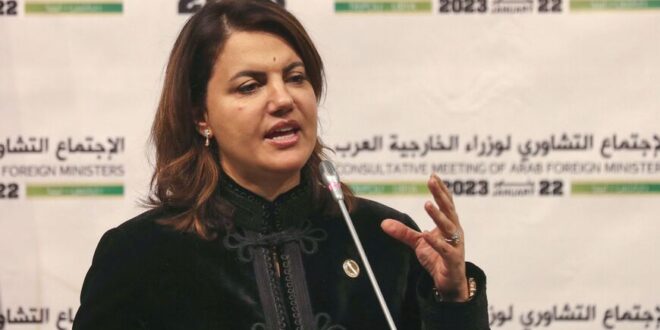The Libyan government suspended Foreign Minister Najla al-Mangoush after Israel revealed she had met with Foreign Minister Eli Cohen last week in Italy.
Libyan Prime Minister Abdel Hamid Dbeibeh suspended Foreign Minister Najla al-Mangoush Sunday evening, after the Israeli Foreign Ministry revealed that she had met last week in Rome with Foreign Minister Eli Cohen.
A statement issued by the Tripoli-based National Unity Government announced, “It was decided to suspend Libyan Foreign Minister Najla al-Mangoush and to launch an investigation against her.” Israel and Libya do not have diplomatic relations.
Dbeibeh appointed Fathallah al-Zani, the current youth minister, to serve as interim foreign minister. Also on Sunday evening, Libyan-based Alwasat cited unnamed security sources who claimed that Mangoush had fled the country after the meeting became public and was headed for Turkey.
Israel’s Foreign Ministry on Sunday afternoon had released a statement revealing that the two ministers had met the previous week in Italy, noting that it was the first-ever encounter between foreign ministers of the two countries.
“The historic meeting with Libyan Foreign Minister Najla al-Mangoush constitutes a first step in the creation of ties between Israel and Libya,” said Cohen, who was quoted in the statement. “The size and strategic location of Libya provides enormous importance and enormous potential for the State of Israel to establish ties with it.”
Cohen further stated, “I spoke with the foreign minister about the great potential for our countries with such ties, as well as the importance of preserving the heritage of Libyan Jewry, including renovating synagogues and Jewish cemeteries in the country.”
The Israeli foreign minister thanked his Italian counterpart, Antonio Tajani, for hosting the meeting and also stated that Israel “operates vis-a-vis several countries in the Middle East, Africa and Asia, in order to expand the circle of peace and normalization with Israel.”
Revelation of the secret meeting in Rome sparked anger and protests in Libya, with several Libyan parliamentarians demanding that the government clarify whether the encounter had proceeded with the approval of the prime minister and the government. Demonstrators took to the streets in Tripoli and other cities, blocking roads, burning tires and waving the Palestinian flag, to protest the meeting.
Libya’s Presidential Council stated that it was illegal to normalize relations with Israel, and the parliamentary speaker’s office accused Mangoush of treason. A statement issued by the Muslim Brotherhood–affiliated Justice and Construction Party said, “We condemn the reports in the Israeli media about the meeting between the two foreign ministers. This step, which hurts the entire Libyan people, requires clarification.”
In parallel, the Israeli announcement generated an avalanche of reports in Israel and abroad along with efforts to determine whether the meeting had been prearranged.
The Libyan Foreign Ministry stated, “[Mangoush] firmly refused to hold a meeting with any Israeli representative and stands by her refusal. What happened in Rome was an unplanned and unofficial encounter during her meeting with the Italian foreign minister.” It further asserted, “There were no discussions or agreements made, quite the opposite; the minister presented her uncompromising stance and did not retract from her position regarding the Palestinian issue.”
Meanwhile, the Israelis have presented a different version of events. An unnamed diplomatic source cited by Ynet said the encounter occurred at the residence of the Italian foreign minister and that it was not spontaneous. Reuters also cited an unnamed senior Israeli diplomat saying the meeting lasted for more than an hour and was coordinated with the highest authorities in Libya.
Israeli opposition leaders slammed Cohen over the announcement of the meeting, arguing that it should have remained secret until conditions were right for steps toward normalization. The Israeli government’s coalition deal stipulates that Cohen serve one year as foreign minister, after which at the end of December Israel Katz, the current energy minister, is expected to replace him for a two-year period. After that, Cohen will return to the Foreign Ministry to lead it in the government’s final year. The opposition claims Cohen rushed to publicize diplomatically sensitive meetings out of personal interest.
“This is what happens when you appoint Eli Cohen, a person with no background in the field, as foreign minister for only one year,” said opposition leader Yair Lapid. “They use another person, [Strategic Affairs Minister] Ron Dermer, as the alternative foreign minister, put a third minister, Israel Katz, on hold, entrust international outreach to a fourth minister, [Public Diplomacy Minister] Galit Distel Atabrian, and let a fifth minister, [Diaspora Affairs] Amichai Chikli, manage relations with world Jewry.”
Lapid slammed the announcement as a “national disgrace and risking human life for a headline.”
Since the signing of the Abraham Accords in 2020 — normalizing relations between Israel and Bahrain, Morocco and the United Arab Emirates — Israel has tried to expand ties with additional Arab and Muslim countries. Sudan has agreed to normalize ties within the framework of the Abraham Accords, but a formal agreement is yet to be signed. Some Libyan Jews, the vast majority of whom emigrated years ago to Israel, Europe and the United States, have tried over the years to assist Israeli authorities in its attempts to establish ties with Libya.
In November 2021, Haaretz reported that Saddam Hifter, son of General Khalifa Hifter, a Dbeibeh opponent, had arrived at Israel’s Ben-Gurion airport for a secret visit lasting a few hours to advance the establishment of relations between the two countries. At the time, the senior Hifter would have been leading an eastern offensive against the Tripoli government. In January 2022, Al Hadath Syria reported that Mossad chief David Barnea had met in Jordan with Dbeibeh to discuss normalization and security cooperation. At the time, Dbeibeh denied the meeting had taken place.
 Eurasia Press & News
Eurasia Press & News



